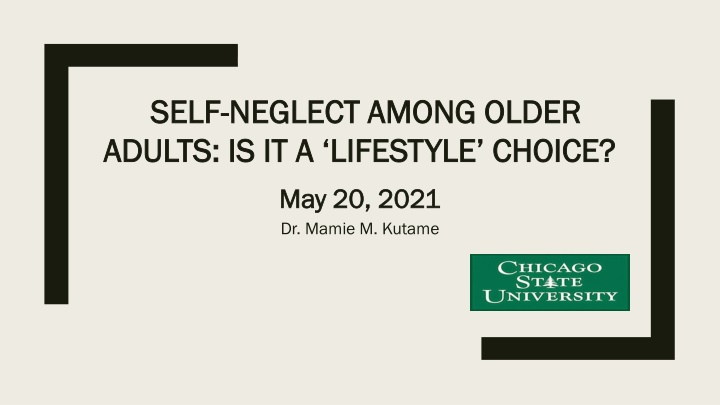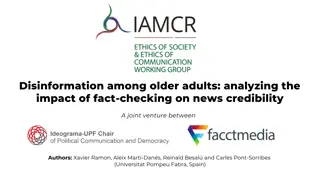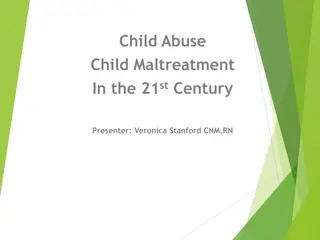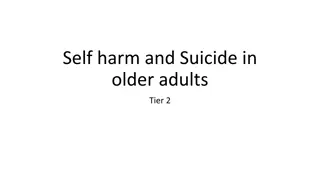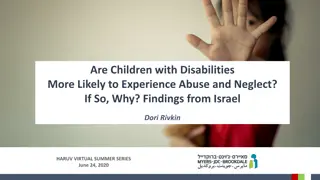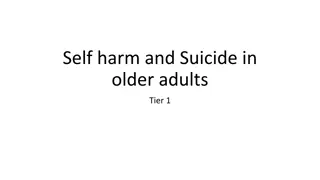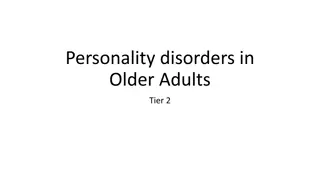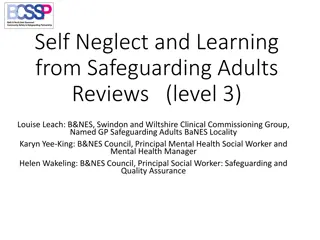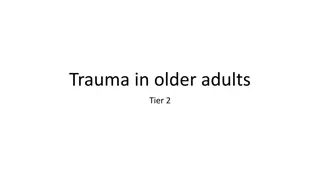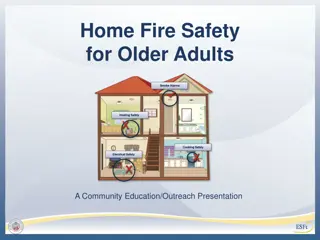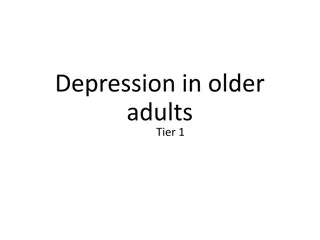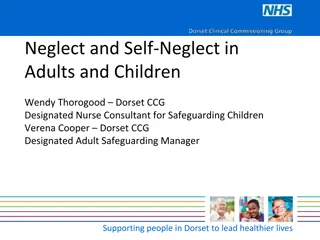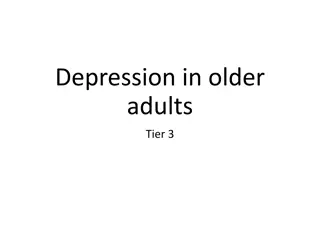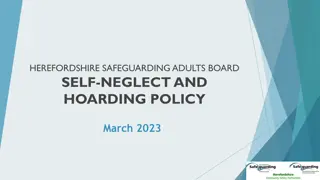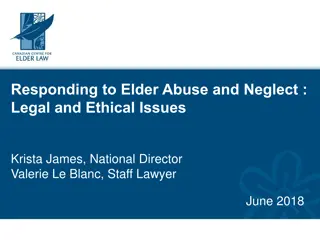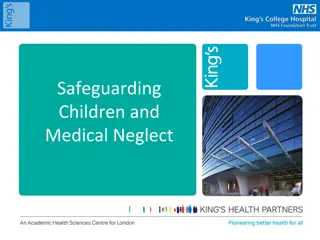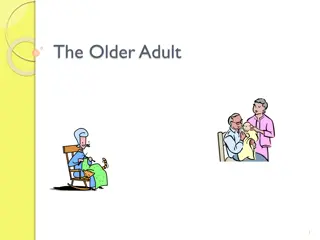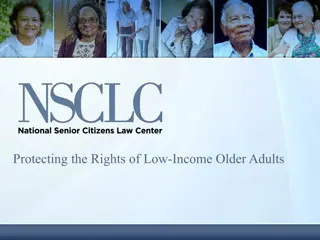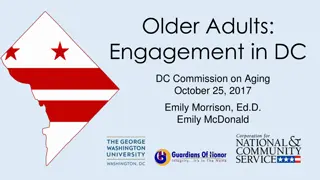Self-Neglect Among Older Adults: Lifestyle Choices?
Self-neglect among older adults poses significant risks to health and safety. This issue is a global concern that requires understanding risk factors, theoretical perspectives, and lived experiences. The changing demographics in the United States point to the growing importance of addressing self-neglect to improve overall well-being. Learning about the scope and implications of self-neglect is crucial for effective social service delivery.
Download Presentation

Please find below an Image/Link to download the presentation.
The content on the website is provided AS IS for your information and personal use only. It may not be sold, licensed, or shared on other websites without obtaining consent from the author.If you encounter any issues during the download, it is possible that the publisher has removed the file from their server.
You are allowed to download the files provided on this website for personal or commercial use, subject to the condition that they are used lawfully. All files are the property of their respective owners.
The content on the website is provided AS IS for your information and personal use only. It may not be sold, licensed, or shared on other websites without obtaining consent from the author.
E N D
Presentation Transcript
SELF SELF- -NEGLECT AMONG OLDER NEGLECT AMONG OLDER ADULTS: IS IT A LIFESTYLE CHOICE? ADULTS: IS IT A LIFESTYLE CHOICE? May 20, 2021 May 20, 2021 Dr. Mamie M. Kutame
Learning Objectives Upon completion of this workshop, participants will be able to: Understand the scope of the problem and identify risk factors that contribute to self-neglect among older adults Understand the theoretical perspectives that guided the study
Learning Objectives Understand the lived experiences of study participants Implications for social service delivery
Definitions of Self-Neglect ...an adult s inability, due to physical or mental impairment or diminished capacity, to perform essential self-care tasks including: a) obtaining essential food, clothing, shelter, and medical care; b) obtaining goods and services necessary to maintain physical health, mental health, emotional well-being, and general safety; C) managing one s own financial affairs (Elder Justice Act, 2010, p. 785).
Significance of Self-Neglect Self-neglect is a global public health and human rights issue that threatens older people s health and safety (Dong, 2017).
Significance of Self-Neglect The changing demographic trends in the United States: It is projected that by the year 2030, one in five Americans will be those 65 years and is projected to reach 23.5% (98 million) by 2060 (Colby & Ortman, 2014). Medical and scientific triumphs over infectious diseases and management of chronic conditions-increased longevity
The Scope of Self-Neglect Increased use of Emergency Department and risk of nursing home placement (Dong, 2017; Dong et al., 2013; Dong et al., 2012). Increased hospitalization, increased morbidity and greater rate of 30-day hospital readmission (Dong et al, 2012; Dong, 2017; Dong & Simon, 2015).
The Scope of Self-Neglect Self-neglecting older adult more likely to have poor quality of life (Dong, 2017; Lachs et al., 1998; Zhao, 2017). High mortality rates among older adults reported to Adult Protective Services (Dong & Simon, 2012; Reyes-Ortiz et al., 2014).
Proposed Theories About the Etiology of Self-Neglect Social Breakdown Syndrome: Stressful life events such as widowhood and deteriorating physical conditions contribute to self-neglect (Reyes-Ortiz, 2001;Ungvari & Hantz, 1991). An excellent example of self-neglect as a result of Social breakdown syndrome is documented in the life of Jane, a 78- year-old retired teacher (In Anetzberger, 2005, pp. 47-48).
Prevalence of Self-Neglect Chicago Health and Aging Project (CHAP) study suggested that 1 out of 9 older adults experience some form of self-neglect in a community setting (Dong et al., 2012).
Prevalence of Self-Neglect A study within a cohort of 3,159 community-dwelling Chinese older adults in Chicago found that the overall prevalence of self-neglect was 29.11%, with 18.24% being categorized as mild and 10.8% as moderate to severe (Dong, 2014).
Prevalence of Self-Neglect Within a cohort of 4,627 older adults, the prevalence of self- neglect by race: Black older adults (men 13.2%; women 10.9%) White older adults (men 2.4%; women 2.6%) 5 domains assessed: personal hygiene, hoarding, house in need of repairs, unsanitary conditions & in adequate utilities (Dong et al, 2012).
Prevalence of Self-Neglect For those with less than high school education within the same cohort (4,627), the prevalence of self-neglect was 14.7% in men and 10.9% in women. For those with annual income less than $15,000, the prevalence of self-neglect was 21.7% in men and 15.3% in women (Dong et al., 2012).
Risk Factors that Contribute to Self-Neglect Empirical Research Findings: Executive function is important for planning, initiation, decision-making, organizing and carrying out tasks Executive dysfunction (difficulty problem-solving, managing finances, identifying dangerous situations, etc. (Dyer et al., 2007).
Risk Factors that Contribute to Self-Neglect Old age Living alone Untreated medical conditions Chronic medical conditions and non-compliance with medications Mental illness, Substance abuse/alcohol
Risk Factors that Contribute to Self-Neglect Depression, Dementia Inadequate social support Lower levels of education & economically disadvantaged History of trauma Severe disability, requiring assistance with ADLs & IADLs
Ethical Considerations Variety of scenarios when working with older adults who self- neglect including: Elements of self-determination, personal independence, lifestyle choices Laws and regulations of states statues that protect adults come together. These complexities often require the proverbial wisdom of Solomon (Simmons & O Brien, 1999, p. 34).
Ethical Considerations/Case Study Competence is a legal determination of mental capacity. Legal standards for evaluating capacity are generally based on the patients ability to: Understand relevant information about their condition and proposed treatment Appreciate the nature of their situation, including their underlying values and potential consequences of their choice Reason about the potential risks and benefits of their choices, and express their choice (Baruth & Lapid, 2017).
Assessment Assess to determine risk of harm Assess to determine capacity
Lived Experiences of Older Adults Who were Identified as Self-Neglecting Understanding Self-Neglect from the Older Person s Perspective was a qualitative study conducted in 2007. There were 4 Research Questions: What were the lived experiences of the older adults identified as self- neglectful? What were the salient issues in the lives of those older persons identified as self-neglectful?
Lived Experiences of Older Adults Who were Identified as Self-Neglectful Research Questions Cont d: How did those older persons experience self-neglect? What were the meanings of those experiences to the study participants?
Lived Experiences of Older Adults Who were Identified as Self-Neglecting Participants were from APS and home health; had multiple unmet needs as defined by APS as self-neglect and had willingness to participate Sample size (n-12), 2 male and 10 female Ranged in age from 73-94, with average age of 81
Sample Risk Factors/signs for Study Participants Sample Risk Factors/signs for Study Participants No children with legal/drug problems Widowed Lacked support for higher education Miscarriage Son/Family Low paying jobs all their lives X Financial constraints in old age Caregiver to family prior/during study Pets/ Hoarding Divorced Names Names Ms. Ms. Summers Summers Ms. Knight Ms. Knight X X X X X X x Ms. Lane Ms. Lane X X X x Ms. Clay Ms. Clay X X X X Ms. Lamb Ms. Lamb X x Mr. Mova Mr. Mova X X X X Ms. Waters Ms. Waters X X x Mr. Wells Mr. Wells X X X X X Ms. Ms. Peoples Peoples Ms. Ms. Gardner Gardner Ms. Ms. Roebuck Roebuck X X X
Sample Risk Factors/Signs for Study Participants Sample Risk Factors/Signs for Study Participants Difficulty managing finances conditions x x Names Names Falls Chronic medical Feelings of vulnerability Difficulty with ADL/IADL Complaints of physical weakness x Ms. Ms. Summers Summers Ms. Knight Ms. Knight x x x x x x x x x x x x x x x x x x x x x x x X x x x x x Ms. Lane Ms. Lane x Ms. Clay Ms. Clay x x x x Ms. Lamb Ms. Lamb Mr. Movva Mr. Movva Ms. Waters Ms. Waters x x Mr. Wells Mr. Wells Ms. Peoples Ms. Peoples x Ms. Gardner Ms. Gardner Ms. Ms. Roebuck Roebuck Ms. Flowers Ms. Flowers X x x x
Lived Experiences of Older Adults Who were Identified as Self-Neglecting Marital status: Married-2 Single -1 widowed-5 divorced 4 Educational attainment varied from four year college education to fourth grade Living arrangements: 8 lived alone, with five living in apartments and three living in their homes; the other 4 lived with others in apartments or homes
Theoretical Perspectives that Guided the Study Three theoretical perspectives: 1. Compliance Theory 2. Ecological Theory 3. Symbolic Interactionism
Theoretical Perspectives that Guided the Study Compliance-the extent to which a patient engages in behaviors consistent with clinical instructions (Dracup & Melesis, 1982). Self-neglect and non-compliance have similar concepts as both refer to client s lack of participation in prescribed regimen (Reed & Leonard, 1989). In self-neglect, refusal of services is more commonly used than non- compliance
Theoretical Perspectives that Guided the Study Ecological theory-focuses on interactions and the goodness of fit between individuals within their environments Where the environment cannot accommodate the changing needs of the older adult, a poor fit will result (Germain & Gitterman, 1996; Gitterman & Germain, 2008).
Theoretical Perspectives that Guided the Study Symbolic Interactionism: Major social psychological perspective associated with George Herbert Mead & Herbert Blumer (Patton, 2002). Focused on the subjective meaning of human behavior how older persons in the study perceived their circumstances (Patton, 2002).
Data Collection & Research Instrument Semi-structured one time face-to-face interviews, researcher observations, and field notes Multiple case study designed was used Interview was audio-taped, transcribed verbatim and analyzed
Research Findings Although the Kutame study was conducted in 2007, however, it was an important study and the second known to interview older adults about their experiences with self- neglectful. The first known study was Bozinovski (1995; 2000). Since 2007, other researchers (Day, 2012; Lien et al., 2016) have conducted similar studies and found common themes as in the previous two studies
Findings From The Study Ten themes emerged from the analyzed data: 1. Experience of living with a medical/health condition 2. Perception of health and medical care seeking behavior 3. Sense of mistrust 4. Difficulty with activities of daily living/instrumental activities of daily living 5. Lack of adequate resources/services
Findings From The Study Themes cont d: 6. Pride in self-sufficiency 7. Good and helpful to others 8. Unfulfilled dreams 9. Connectedness to places and things 10. God, prayer, and coping mechanisms
Narratives From The Themes Experience of living with a medical/health condition Here, Mr. Movva commented on his experience with arthritis: then my hand be tired and weak and everything drop. Everything I take in my hand, I get in my hand, it fell out of my hand. I can hardly hold a glass of water, you know. I have to hold it with both of my hands.
Narratives From The Themes Perception of health & medical care seeking behavior: Ms. Gardner had this to say about her health seeking behavior- It s not necessary to see a doctor every year. Medicare doesn t pay for all that stuff any how so why bother if you don t have to? What the heck?...Never went to doctors never went to see doctors unless I was pregnant and that was it.
Narratives From The Themes Mistrust of health care professionals, which included skepticism about prescribed medications, recommended medical regimen, and subtheme that focused on relationships with friends and family. Many participants also felt vulnerable and tried to protect themselves and maintain control in their lives (Kutame, 2007).
Narratives From The Themes Sense of mistrust cont d: Mr. Movva shared he was previously receiving physical and other therapies, however, had stopped because he questioned whether the therapy was helping: They come out here whole year taking therapy therapy don t do nothing either and the people say, I don t want to do therapy. I want to do therapy but they ain t going to help
Narratives From The Themes Difficulty with ADL/IADL Cont d: Ms. Clay described having difficulty with combing her hair. I have trouble combing my hair. Getting my arms up in the air, you know. Sometimes I have to take one hand that push my arm up like this to get to comb .my hair. I got awful bad up here, my shoulders here my back and my legs give way on me if I do something I know that I m not supposed to do .
Narratives From The Themes Difficulty with ADL/IADL Cont d: Most participants talked about their eating habits and food preferences, in various forms. One participant said she could have Meals on Wheels, but added, I don t care for their food. Some participants shared they were eating once a day because they felt no hunger. One participant said she would go all day until evening before feeling hungry when she would open up some real good can soup or cook potatoes, or somethings that s quick, to get done. Something s that you put in the microwave and cook (Kutame, 2007).
Narratives From The Themes Difficulty with ADL/IADL Cont d: Multiple factors affected those older persons decisions about diet and nutrition. Some had denture problems. Others lacked an appetite, perhaps because of psychological and/or emotional reasons as in the situation of one participant who had lost significant amount of weight, which she attributed to the change in her appetite, not feeling hungry and not having a good appetite. This participant was facing foreclosure on her home. (Kutame, 2007)
Narratives From The Themes Lack of adequate social resources/services: This theme focused on participants inadequate resources and lack of services to help them maintain their support system and to pay for heat to keep the homes warm, their prescription medications, and home repairs. Ms. Clay was on the energy assistance program, but claimed that the program hardly helped her. She also wanted a haircut, but she was to pay the $7.00 it would cost to have this done (Kutame, 2007).
Narratives From The Themes Difficulty with activities of daily living/instrumental activities of daily living: Participants struggled to complete ADL/IADL. Below, Ms. Lamb described her difficulties completing chores. It s depressing, it s depressing, because I can t. I want to do and I can t, that s the thing. I sit here and see the dirt and the mess. I would like to jump up and do it but I can t The sores on my feet are stopping me. The sores on my feet are stopping me
Narratives From The Themes Lack of adequate resources/services cont d: In the study, five women were widows, and two had multiple marriages. One widowed participant expressed bitterness at the extra-marital affairs her husband had prior to his illness and death, the majority of the widows shared they had experienced good marriages, but their circumstances at the time of the study were due in part to their husband s death
Narratives From The Themes Lack of adequate resources/services cont d: Some of the widowed participants missed their husband s physical presence, but also confronted reduced social and economic resources and lifestyle changes. Some had to relocate; these were major challenges that they had to face alone for the first time in their lives. (Kutame, 2007).
Narratives From The Themes Pride in self-Sufficiency: Sometimes it is difficulty for professionals and service providers to understand why some seniors who need services are reluctant to ask for help and hesitantly accept assistance. One reason for their resistance is due to their sense of pride. Under this theme, there were three major issues: (1) values learned from their parents such as you don t be scared and don t go out and beg ; (2) doing a good job and maintaining self-sufficiency; and (3) avoiding assistance from agencies and service organizations (Kutame, 2007).
Narratives From The Themes Pride and self-sufficiency Cont d: Ms. Lane shared values she learned from her mother: That s the way my mother brought me up, don t go out there and beg. You don t beg for nothing unless you really down and out
Narratives From The Themes Good and helpful to others: Another important theme that emerged from this study was that participants perceived themselves as good and helpful to family, friends, and others who were in need. Mr. Wells commented that he bought a lot for his mother when he was younger: When I was young I used to buy my mom a lot of stuff. I used to you know, go to the store and what she likes, I used to bring stuff like that. You can tell a person how they take care of their parents
Narratives From The Themes Unfulfilled Dreams Most participants experienced unfulfilled dreams, though they varied in their descriptions. For the most part, the participants dreams varied from wishes about getting a good education to working a well-paid employment to having a baby.
Narratives From The Themes Unfulfilled Dreams Cont d: Ms. Summer shared her experience of lack of opportunity for formal education. I just wish that I could have went to school and I would have a better have had a better job. I would have made more money I always wanted to be a nurse I wanted that job but I couldn t do it because I didn t have an education
